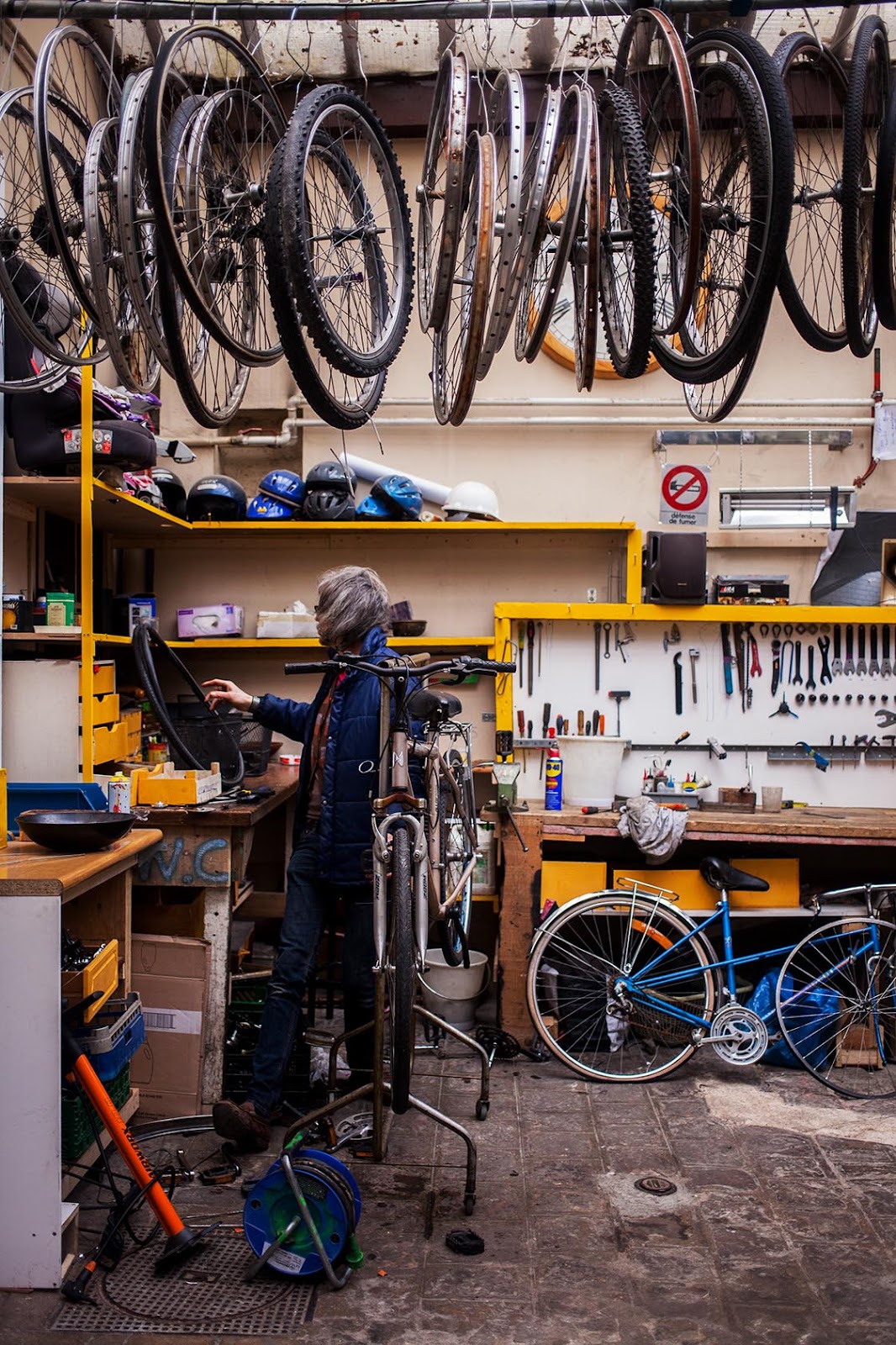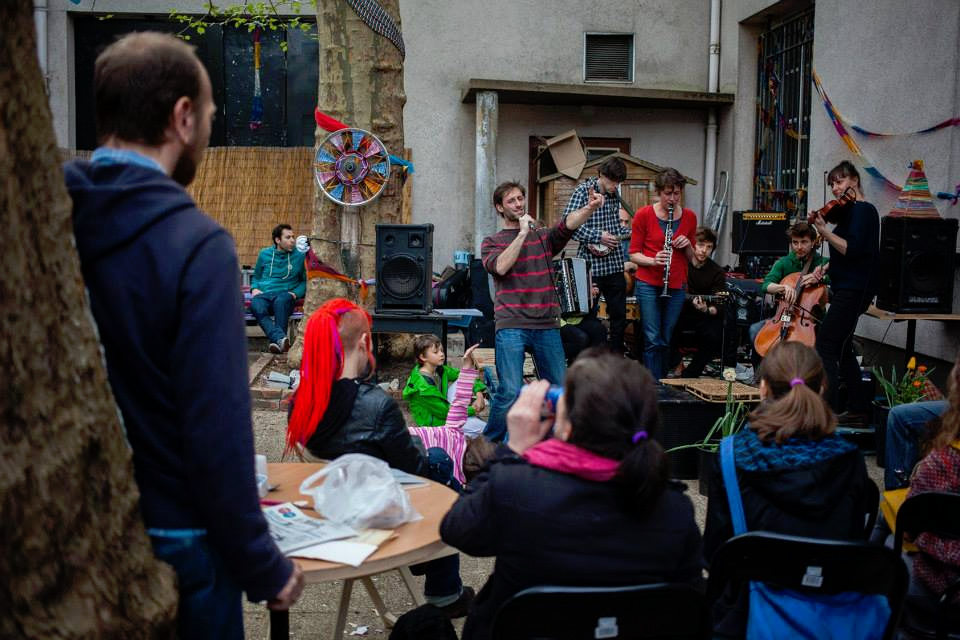Dear Workers, around this same time last year, I finished a one and a half month hitchhiking tour of France with my travel companion Mike Elderbrook and found myself living in a squat (an abandoned building illegally inhabited by non-owners). I discovered it, a place known as Stendhal squat, when I was still with Mike passing through Paris. We had been searching for cheap lodging in Paris two weeks earlier when a friend said to try this address, that maybe some of her friends still lived there. Not knowing anything about the place, the people, the living situation, if they they would have room for us or if they even let strangers stay there, Mike and I went.
The first time I saw the dingy blue doors it was sundown and there was a grinning, mostly toothless, french man of asian descent named Loon smoking a joint and sipping on a beer in front of the “abandoned” hospital. Weary from travel, we had a short conversation in which he noticed my American accent and invited us inside for a break from our journey. He let us in with a quiet reminder to watch our stuff closely and offered us various substances to relax until he could ask the other squatters whether we could stay there. The spacious once-upon-a-time reception hall had scarred concrete floors scantily clad in tattered worn fabric. The unfinished drywall had posters, superb graffiti, and long ago written notes pockmarking its face. There were scattered beautiful paintings and drawings done right on the walls and floors. There were at least thirty bicycles hanging in that room with old refrigerators, old clothes, beer cans, and beat up furniture with a couple of twenty somethings lounging and smoking.
 Quickly welcomed and assured lodging, the tour we received of the eight level complex was fairly shocking. Alongside the hallways and rooms resembling the reception area, there were also a home-built stage and auditorium with high tech sound and light systems, a free clothing store, a not so small library, a pristine white dance hall, and an immense labyrinth of a bicycle workshop. It seemed an odd combination of a blooming renaissance and decrepit chaos.
Quickly welcomed and assured lodging, the tour we received of the eight level complex was fairly shocking. Alongside the hallways and rooms resembling the reception area, there were also a home-built stage and auditorium with high tech sound and light systems, a free clothing store, a not so small library, a pristine white dance hall, and an immense labyrinth of a bicycle workshop. It seemed an odd combination of a blooming renaissance and decrepit chaos.
Later that night, we witnessed a borderline bacchanalia of the thirty mostly young squatters (between 20 and 35 years old) in which the dancing, hallucinating, table thumping, smoking, and drinking members celebrated their comrade's birthday. Although it was intense, it was amazing how welcoming and trusting they were with their things. We were given food, new clothes, access to their somewhat working bathrooms, and were offered a variety of substances. That night, we slept in an old hospital room with two stained mattresses and bug infested pillows while the party raged on a few floors below; I have never slept so well.
I decided to come back alone two weeks later to discover more about this lifestyle; I ended up living there for almost a month. The people who lived there were mostly french students, artists, musicians, activists, and scientists along with a couple of ukrainian refugees and me. The life there had a different pace. Some people had jobs and some didn’t but everybody was a freegan (meaning that we only ate “expired” or thrown out food which we found on the ground after markets or in the trash). The love of the earth and a respect for human freedom was palpable. Many in need of home, shelter for a night, or a meal stopped by on a daily basis and were given help freely and joyfully. Art, drugs, hospitality, music, and coffee were priorities and everyone took part in them. The daily schedule for many squatters was waking up at noon, drinking absurd amounts of coffee, taking various creative drugs to “enhance creativity,” doing some sort of work on a skill or for a business till mid afternoon, then drinking and partying till well past midnight every night. On a weekly basis though, there were plays, dance lessons, philanthropic/activist meetings and reunions happening there. There were entrepreneurs and scientists living there and continuing their research in the midst of this chaos. There was a bicycle workshop that involved dumpster diving for old bicycles which were then repaired and given to refugees who otherwise had no other mode of transport.
 A complex philosophy structured life there, and if you can read French then you can find out more about it here: http://lestendhal.net. I thought I was encountering a sort of underground left wing rebellion against “the man” and the socially constructed “needs” that suck our soul away. In some ways, this is what it is but there is a different texture to it. I could not understand how such abject hedonism existed in harmony, albeit imperfectly, with a seemingly selfless philanthropic project. Of course there were the inevitable contradictions between philosophy and practice that manifested themselves clearly in the actions and words of my friends. Yet, hypocrisies, which are so rampant in religious, political, and idealistic circles, needed no tortured explanations to keep a false sense of continuity and righteousness within the community, but were regarded as a natural part of working through the neuroses of living in a postmodern world and coping with the seeming purposelessness spawning from the lack of an apparent rival. I couldn’t figure out who the enemy was. Was it the government? The USA? The materialists? I was expecting to find clenched fists but all I found were hugs and kisses. I didn’t get it, they didn’t seem to be fighting for something. It slowly dawned on me over the next few weeks though. There wasn’t so much a sense of fighting back but of letting go and easing into a lifestyle in which they could undergo change.
A complex philosophy structured life there, and if you can read French then you can find out more about it here: http://lestendhal.net. I thought I was encountering a sort of underground left wing rebellion against “the man” and the socially constructed “needs” that suck our soul away. In some ways, this is what it is but there is a different texture to it. I could not understand how such abject hedonism existed in harmony, albeit imperfectly, with a seemingly selfless philanthropic project. Of course there were the inevitable contradictions between philosophy and practice that manifested themselves clearly in the actions and words of my friends. Yet, hypocrisies, which are so rampant in religious, political, and idealistic circles, needed no tortured explanations to keep a false sense of continuity and righteousness within the community, but were regarded as a natural part of working through the neuroses of living in a postmodern world and coping with the seeming purposelessness spawning from the lack of an apparent rival. I couldn’t figure out who the enemy was. Was it the government? The USA? The materialists? I was expecting to find clenched fists but all I found were hugs and kisses. I didn’t get it, they didn’t seem to be fighting for something. It slowly dawned on me over the next few weeks though. There wasn’t so much a sense of fighting back but of letting go and easing into a lifestyle in which they could undergo change.
To use Girardian concepts, there was an incredibly underwhelming sense of having no enemies--there was no revolution of the “poor downtrodden rising up to crush the maleficent bourgeoisie who had cruelly enslaved them,” nor was there a “good chosen people trying to bring truth to the reckless non-believers before they destroy the world”; rather, there was a gradual movement away from systems based around conflict. It was an exodus of the self-proclaimed disillusioned starting to move away from systems that perpetuate various types of violence to give a self-defined feeling of victory once some arbitrary goals are met (most typically, defeating the “other”). And it was in this bizarre intersection of peace and rebellion that I heard about the murders and subsequent events in Charleston, South Carolina.
I watched as we packed the still warm bodies of the slain into ammunition to wage our old political and cultural wars. Hoping to make sense of the cruelty, we framed the events to confirm our pre-existing beliefs so that we could be vindicated and exonerated of blame by identify with the victims. We set up nuance as the enemy of truth because we are afraid of what conceding ground means for us. With the ferociousness of our conviction, we mutually blind one another to the very light we want the other to see. In the vacuum of this fighting we suffocate the possibility of any concessions--that a gun makes it easier to act on the violent and potent impulses that arise from rivalry and ignorance, but also that this same violence can manifest itself no matter whether we can access a gun or not. This pattern is played out time and again in different political arenas: abortion, marriage laws, the death penalty, and even what bathrooms we can use.
In contrast, I saw in these hippies a genuine goodness that I hope to see in my community and myself one day. It’s not only their simplicity and generosity, but their openness to change and live in the tension of competing philosophies. While not advocating that we all become drugged-up, hedonistic hippies, I hope that by gradually loosening our grip on a seamless worldview in which we are the “good,” there can be space for real grief to inform us of our daily collective and individual complicity in a system of rivalry and violence.
Now, almost a year later, I am trying to convince myself that this is possible in our present political climate. We should ask ourselves who we have set up as our ideological rivals. We spend much of our time decrying the various heresies of competing denominations, bemoaning the falsehoods of our political adversaries, and touting the beauty of our own just and informed ways. How often do we listen to the opposition, truly seeking to understand their ideas and justifications? I believe it is only in this spirit that we can begin the slow, underwhelming process of working through our problems without overcoming them as enemies, but undergoing them as products of our collective/individual human ignorance.
Love,
Sam











